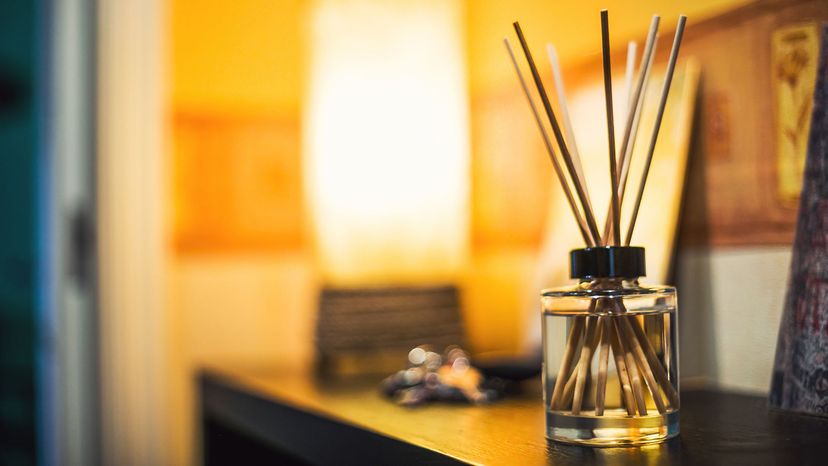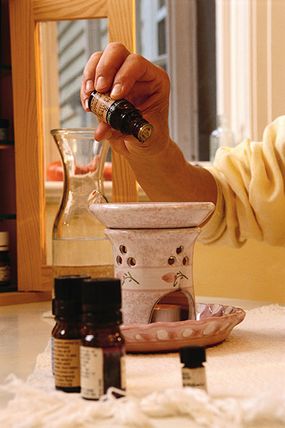
Although incense and candles are still around, there's no denying the stronghold that essential oils have on today's aromatically inclined society. Whether they're used to "treat" an ailment or simply make a room smell nice, they seem to be just about everywhere.
Although essential oils date way back to ancient Egypt, their modern surge started to occur in the 1970s when more people became interested in natural medicine. Today, mega-manufacturers like Young Living and doTERRA offer a variety of oils rumored to cure just about every ailment out there. But the million-dollar question is, are oils and the diffusers used to emit them safe?
Advertisem*nt
First, it's important to know that oils can be applied directly to the skin, or via a diffuser to perfume the surrounding air. If you're going the latter route, there are many types of diffusers to choose from, including ceramic, reed, electric and ultrasonic diffusers. They all function differently, but the end result is that they aerosolize the oils, meaning that they're turned into a fine spray in the air.
Here's where the question of safety gets sticky – the effect of essential oils varies from person to person. "In general, oil diffusers are safe. Their risk of harm is mostly limited to superficial things related to device function, such as burns and minor allergic reaction," explains Dr. Eric Lee, a general practitioner based in StLouis, Missouri, with InvigorMedical via email. "The FDA [Food and Drug Administration] has labelled essential oils as GRAS (generally recognized as safe)."
Advertisem*nt
Contents
- Oil Diffuser Safety Concerns
- Aromatherapy Claims Versus Research
- Using Essential Oils in a Diffuser
Oil Diffuser Safety Concerns
As Lee noted, there is potential for a diffusing device to malfunction or burn the user through incorrect handling, so many people choose to avoid styles that involve use of an open flame for safety reasons. Not surprisingly, these tend to be the least expensive type of diffuser.

Still, that doesn't mean the other types are perfectly safe. Although Lee doesn't tell patients which type of diffuser to use at home, he is leery of ultrasonic diffusers that employ a water reservoir to function. "Like other water-containing home machines (like a CPAP), they can be difficult to clean and encourage growth of microbes," he explains.
Advertisem*nt
And Lee would never recommend using essential oils in a health care setting. "In 2016, patients' families in an ICU in Austria shared a bottle of essential oil, resulting in the spread of a multidrug resistant strain of bacteria," he recalls. Fortunately, the outbreak was handled appropriately, and infection peaked at seven people.
Diffusers can also be a risky proposition for people who are sensitive to smells or who have respiratory issues. "In some hospitals where aromatherapy has been permitted, whole-room diffusers have been associated with sensitivity reactions – staff and other patients have been affected," Lee explains. "In health care spaces, there are lots of different patients – and some may be suffering from respiratory conditions worsened by essential oils."
Another side risk of essential oil use is that although the oils might not cause any actual harm, their use could cause delay of evidence-based treatment, as some people wait to see if the oils alleviate the illness in question. So, a simple case of croup that could have been handled via a regular doctor's visit suddenly morphs into an ambulance ride to the nearest emergency room, as a New York Times article pointed out.
Advertisem*nt
Aromatherapy Claims Versus Research
It's not that surprising that people would delay treatment because so many essential oils have been touted to relieve a host of symptoms of many debilitating ailments, like depression, anxiety, nausea and insomnia. Studies have shown that some varieties of oils are effective antimicrobials, and oils from plants like garlic and thyme can even take down the Lyme disease bacterium better than the standard antibiotic. But human trials have yet to confirm that last claim.
The lack of large-scale research is indeed a sticking point for many doctors. "For clinicians to be comfortable prescribing and treating patients with essential oils, rigorous research needs to be performed to evaluate each health claim," Lee says, noting that almost all studies on essential oils to date measure a short-term effect such as perceived anxiety before and after a doctor's visit. "Ideally, each essential oil would be researched in the context of each health claim it is purported to have. For example, if lemon oil is supposed to make your skin shinier and also increase your mood, then research would have to be designed for each of these."
Advertisem*nt
Currently, essential oils are not subjected to the same rigorous standards as medical drugs because they're classified as botanical products. "As such, they are not regulated as a pharmaceutical, and do not need to have laboratory testing verifying their contents or concentrations," Lee says. "This has led to essential oil producers providing their own false 'certifications' on their label," such as ultra-pure, authentic and distilled. Don't fall for the labelling hype, though. "None have meaning," he says.
Using Essential Oils in a Diffuser
"Practically, I feel that patients should be able to pursue whatever means they desire for wellness. Life is hard! If you feel that sniffing a lilac makes it less hard, then you should go for it," Lee says. "I just want patients to have the big picture in mind: Essential oils are NOT proven by science, they may have side effects we don't know about, and you should tell [your physician] about everything you are taking."
With those precautions in mind, if you still want to use an oil diffuser, what should you do? Jamie Bacharach, a licensed holistic doctor and head of practice at Acupuncture Jerusalem, has extensive experience with advising patients on oil diffusers. She recommends the following when deciding what oils to use in your diffuser:
Advertisem*nt
- Test a new oil by dabbing a drop on your wrist. Wait to see if there is a negative reaction on the skin. "When diffused, an oil which someone is allergic to can cause serious complications if inhaled."
- Avoid low-quality oils. Some companies use synthetic oils and ingredients as filler to save on costs and enhance scent. "Make certain the oils you're using are natural and 100 percent pure. When diffused and inhaled, synthetic oils and chemical fillers can pose a serious health risk."
- Consult with a doctor if you're an asthmatic. Diffusing natural oils can exacerbate asthmatic symptoms, so get medical expertise before doing this.
- Stay away from oil diffusers when pregnant. "There is insufficient data to draw from when weighing the risks of diffusing a natural oil as a pregnant woman. It is best to steer clear of doing so until the scientific community establishes it as a safe practice."
Now That's Cool
Not all essential oils are created equal. Dr. Lee recommends people select products certified by International Organization for Standardization (ISO) because it's the only way to verify that the essential oils contain what they're advertised to contain.
Oil Diffuser FAQ
What does an essential oil diffuser do?
An essential oil diffuser aerosolizes essential oils, dispenses them into the air and fills the area with a natural fragrance.
Is diffusing essential oils safe for pets?
Diffusing certain essential oils may have benefits for your pets, but some can be extremely harmful, uncomfortable, and even fatal to them. Some oils that are known to be toxic to dogs and cats include mustard, tea tree, eucalyptus, pine and wintergreen, ylang ylang, cinnamon, thyme, and anise, though this list is not exhaustive. Talk to your vet if you have specific questions.
Can breathing essential oils be harmful?
The effect of essential oils varies from person to person, though the Food and Drug Administration has labeled essential oils as generally recognized as safe. It's best to stay away if you're pregnant or asthmatic though, as breathing in essential oils for longer periods of time may be harmful.
Do essential oils really work?
Many people claim that essential oils have had significant health-related benefits and relieved a host of symptoms, however there's a lack of large-scale research to back that up at this time. Essential oils are not subjected to the same rigorous standards as medical drugs because they're classified as botanical products so while it's fine to use them, don't delay medical treatment because you're banking on them curing whatever is ailing you.
How do I choose essential oils?
Essential oils are not created equal, so it's best to choose ones that are certified by the International Organization for Standardization (ISO) as it's the only way to verify that they actually contain what they're advertised to contain. Otherwise you may end up with a lower-end brand that adds synthetic oils and ingredients as filler to save on costs and enhance scent.
I'm an enthusiast with a profound understanding of aromatherapy, particularly the use of essential oils and diffusers. My expertise is rooted in extensive research and practical experience, allowing me to delve into the nuances of safety concerns, the intersection of aromatherapy claims with research, and the practicalities of using essential oils in diffusers.
Safety Concerns with Oil Diffusers: The article rightly points out that while oil diffusers are generally safe, there are potential risks associated with their use. I concur with Dr. Eric Lee's caution about the possibility of diffusing devices malfunctioning or causing burns if mishandled. The mention of avoiding open flame diffusers for safety reasons aligns with common sense, considering the potential hazards involved.
Specifically, the concern about ultrasonic diffusers with water reservoirs is noteworthy. Their association with difficulty in cleaning and the potential for microbial growth raises a valid point. This is crucial information for individuals considering the purchase of such diffusers.
The reference to an incident in an ICU in Austria in 2016 underscores the importance of caution. Sharing essential oils in a healthcare setting led to the spread of multidrug-resistant bacteria. This highlights the need for stringent guidelines when using essential oils in certain environments.
Aromatherapy Claims Versus Research: The article adeptly addresses the discrepancy between the claims made in aromatherapy and the limited scientific research supporting these claims. Dr. Lee emphasizes the need for rigorous research to substantiate health claims associated with essential oils. This aligns with the critical perspective that large-scale studies are lacking and short-term effects are often the focus of existing research.
The classification of essential oils as botanical products, exempting them from the rigorous standards applied to pharmaceuticals, is a crucial point. This regulatory distinction underscores the importance of approaching essential oils with a degree of skepticism, especially considering the lack of standardized testing for contents and concentrations.
Using Essential Oils in a Diffuser: The recommendations from Jamie Bacharach provide practical advice for individuals interested in using oil diffusers. The emphasis on testing a new oil on the skin to avoid potential allergic reactions is a sensible precaution. Furthermore, the warning against low-quality oils and the potential health risks associated with synthetic oils align with established best practices in aromatherapy.
The cautionary notes about consulting with a doctor, especially for individuals with asthma or during pregnancy, are in line with responsible usage of essential oils. This reinforces the idea that while essential oils can be part of a wellness routine, they should be approached with awareness of potential risks and in consultation with healthcare professionals.
In conclusion, the article presents a comprehensive overview of the considerations surrounding essential oils and diffusers, combining practical advice with insights from medical professionals. As an enthusiast in this field, I appreciate the well-researched and balanced perspective provided.
 (2024) - Shopify)
